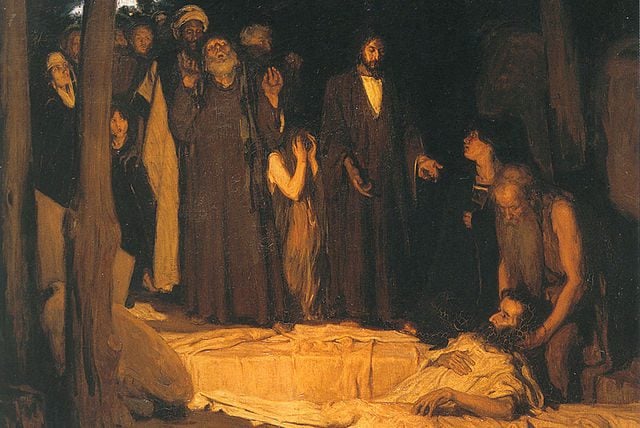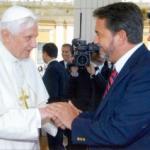
If you’re in a discussion with a Protestant who denies both of these things, and you want to show that they are expressly, explicitly indicated in the Bible, here’s how you can do it quickly and effectively. I also provide further related reading material, in order to go into more depth.
***
1) Praying to Saints (i.e., Asking Them to Intercede): Rich Man and Lazarus
A) The rich man in Jesus’ story (known in tradition as “Dives”) asks Abraham to intercede, making two requests: a) relief from his suffering in the “bad” part of Hades / Sheol (Lk 16:24) , and 2) to send Lazarus to earth to warn his five brothers to repent, so as not to end up in the same place and state (Lk 16:27-28). In Luke 16:27 in the King James Version has him even using the words, “I pray thee.”
B) Whether this is a parable or not (many Protestant commentators say it is not, because parables don’t include proper names), Jesus couldn’t possibly teach doctrinal error by means of the story.
C) Abraham’s refusal to answer the prayer does not prove that he shouldn’t have been prayed to in the first place. Prayers can be refused. He never said, “You can’t pray to me!!!!! Pray only to God!”
D) Nor does his refusal prove that he lacks the power to fulfill the prayer (ultimately due to God’s power, of course). He said no in the first instances, because Dives’ punishment in the afterlife was already determined by God. He refused in the second instance because the “proposal” wasn’t going to work, anyway. He didn’t say, “I don’t have the power to send Lazarus and it’s blasphemous for you to think so.” He said, rather, that if he did send him, it wouldn’t make any difference as to the result Abraham hoped for (Lk 16:21: “If they do not hear Moses and the prophets, neither will they be convinced if some one should rise from the dead” [RSV]).
E) Thus we can only conclude that human beings in the afterlife can be prayed to, and that they have the power (delegated through God, using them as vessels or intermediaries) to fulfill the requests: in other words, exactly what the Catholic communion of saints / invocation of saints holds. And it is straight from our Lord Jesus.
F) Had Abraham fulfilled the request it would also be another instance of permitted communication between those in heaven or the afterlife (in this case, Hades) and those on earth, since the dead Lazarus would have returned to earth, to talk to the five brothers. Protestants tell us this is unbiblical and against God’s will (and is the equivalent of necromancy), yet there it is, right in Scripture, from Jesus.
For more on this, see:
Bible on Asking Dead Men to Intercede (Luke 16) [7-8-14]
Dialogue on Praying to Abraham (Luke 16) [5-22-16]
Dialogue: Rich Man’s Prayer to Abraham (Luke 16) and the Invocation of Saints (vs. Lutheran Pastor Ken Howes) [5-3-17]
If someone asks why we would even think of doing this in the first place, rather than going right to God, I address that, too (highlighting James 5:16: “The prayer of a righteous man has great power in its effects”):
1 Samuel 28:15-16 Then Samuel said to Saul, “Why have you disturbed me by bringing me up?” Saul answered, “I am in great distress; for the Philistines are warring against me, and God has turned away from me and answers me no more, either by prophets or by dreams; therefore I have summoned you to tell me what I shall do.” And Samuel said, “Why then do you ask me, since the LORD has turned from you and become your enemy?”
Jeremiah 15:1 Then the LORD said to me, “Though Moses and Samuel stood before me, yet my heart would not turn toward this people. Send them out of my sight, and let them go! (cf. Heb 12:1; Rev 6:9-10)
Again, it’s not that they couldn’t or shouldn’t pray; rather, even their great prayers (as powerful intercessors: Ex 32:11-12; 1 Sam 7:9; Ps 99:6; Jer 15:1) couldn’t accomplish something if it was already against the will of God. If they in fact weren’t praying to God after their deaths, or shouldn’t have, then God wouldn’t have said that they did so; and/or would have condemned it, having brought it up at all in inspired revelation.
See:
Matthew 27:46-50 And about the ninth hour Jesus cried with a loud voice, “Eli, Eli, la’ma sabach-tha’ni?” that is, “My God, my God, why hast thou forsaken me?” [47] And some of the bystanders hearing it said, “This man is calling Eli’jah.” [48] And one of them at once ran and took a sponge, filled it with vinegar, and put it on a reed, and gave it to him to drink. [49] But the others said, “Wait, let us see whether Eli’jah will come to save him.” [50] And Jesus cried again with a loud voice and yielded up his spirit. (cf. Mk 15:34-36)
The “bystanders” are presented as allies of Jesus, since one of them gave Him a drink, in the next verse (Matthew 27:48). The next verse (27:49) again shows that this was common belief at the time: “But the others said, ‘Wait, let us see whether Eli’jah will come to save him.’”
Thus, it was believed that one could pray to one such as Elijah (who had already appeared with Jesus at the transfiguration), and that he had power to come and give aid; to “save” a person (in this case, Jesus from a horrible death). It’s not presented as if they are wrong, and in light of other related Scriptures it is more likely that they are correct in thinking that this was a permitted scenario.
Jesus, after all , had already referred to Elijah, saying that he was the prototype for John the Baptist (Mt 11:14; 17:10-13; cf. Lk 1:17 from the angel Gabriel), and it could also have been known that Elijah and Moses appeared with Jesus at the transfiguration (Mt 17:1-6), if these were His followers.
See:
4) The Apostle Paul Prayed for the Dead
2 Timothy 1:16-18 (RSV): “May the Lord grant mercy to the household of Onesiphorus, for he often refreshed me; he was not ashamed of my chains, [17] but when he arrived in Rome he searched for me eagerly and found me – [18] may the Lord grant him to find mercy from the Lord on that Day – and you well know all the service he rendered at Ephesus.” (cf. 4:19)
For more on this, see:
Paul Prayed for Dead Onesiphorus (Protestant Commentaries) [7-14-09]
Cardinal Newman on Onesiphorus and Prayer for the Dead [Facebook, 3-18-15]
St. Paul Prayed for a Dead Man: Onesiphorus [8-19-15]
Was Onesiphorus Dead When Paul Prayed (Or, “Wished” as it Were) for Him? Data from 16 Recent Protestant Commentaries (1992-2016) [Facebook, 3-20-17]
5) The Apostle Paul Taught Penance (Basically the Same as Prayer) for the Dead
1 Corinthians 15:29 Otherwise, what do people mean by being baptized on behalf of the dead? If the dead are not raised at all, why are people baptized on their behalf?
See:
Baptizing the Dead? (Odd Verse 1 Corinthians 15:29) [6-5-02]
Fasting for the Dead in the Old Testament (Not Unlike Praying) [11-4-12]
6) Jesus and Peter Simultaneously Prayed to Saints and for the Dead
Tabitha was a disciple in Joppa who died. Peter prayed to her when he said “Tabitha, rise.” See Acts 9:36-41. She was dead, and he was addressing her. There is no impenetrable wall between heaven and earth. This is not only praying to the dead, but for the dead, since the passage says that Peter “prayed” before addressing Tabitha first person. And he was praying for her to come back to life.
Our Lord Jesus does the same thing with regard to Lazarus. He prays for Lazarus (a dead man: John 11:41-42) and then speaks directly to a dead man (in effect, “praying” to him): “Lazarus, come out” (John 11:43).
See:
New (?) Biblical Argument: Prayers for the Dead [2004]
Raising of Tabitha: Proof of Purgatory (Tony Gerring) (see also in-depth Facebook discussion) [3-20-15]
***
Photo credit: The Resurrection of Lazarus (1896), by Henry Ossawa Tanner (1859-1937) [public domain / Wikimedia Commons]
***













